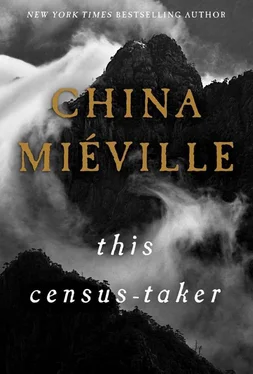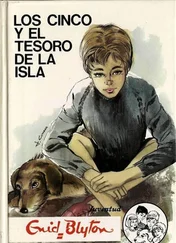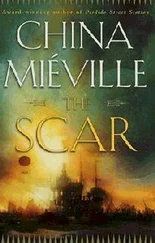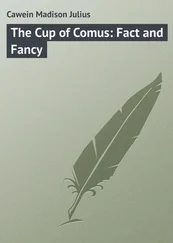The last of it was replaced by silence.
I kept my eyes closed. I heard the man softly clap his hands. I heard his feet on the tunnel floor.
“All right,” he said. “Look at me.”
I opened my eyes.
—
He stood on the edge of the pit. He held his hands out above it, opening and closing his fingers to rid them of dirt.
He looked at me, perhaps kindly. Patiently.
“How did you get over there?” he said. “Can you get back?”
I went to the cave wall. I didn’t want to hesitate in front of him. I set out to cross it again by those handholds.
The man reached out and plucked me from the wall when I was only halfway done. He made me gasp as he braced himself and snatched me. It was so quick, and there I was, blinking foolishly on his side of things, back where I’d always been before.
He put his hand on my shoulder.
“There,” he said.
There were many things I wanted to say, to ask him, but I couldn’t yet speak.
—
It was fully night. I looked past him at the dark side of the hill and the foliage and stone in the sundown. I heard another whinnying honk.
“Your mule,” I said quickly, so he’d know I was just startled, not afraid.
He gestured down the hill and pursed his lips and before he spoke I said, “There’s no one in town for me,” and it was he who was startled this time. He looked at me with interest and care.
“I had…” I said, and thought of Samma and of Drobe and didn’t know how to explain them. On the bridge, Samma might soon hook for bats, at least. “One can’t do any more for me and one’s gone,” I said. “Drobe’s his name.”
That made the man look away from me, down the dark slopes. He seemed to hold his breath.
At which, though I’d been about to tell him more, I stopped. Wherever he was now I had no more to say about poor Drobe.
“There’s no one,” I said in the end.
The man nodded and released his breath and walked out of the cave and waited where the hill began.
“Do you have food in your house?” he said.
“You can’t come in.”
“I know . You’re good at rules. That’s good. I was thinking of you, for the food. Do you have something?”
“Yes.”
“And you could…” he said, and got lost in thought.
“So,” he said eventually, hurriedly. “Like I said, sometimes there are tasks arising —any jobs that the numbers tell me need doing. It’s my job to do them. We had trouble where I come from. Fighting. What we realized is that the more you know about your people, the better. That’s why I go counting.
“I had someone who worked for me.” He spoke carefully. “But she listened to tattle. About me. And in the end she took off with records and messages that weren’t hers to take. She’s gone now. Papers refiled.
“I need a replacement.
“They told me about your father and mother and they told me about you. Law goes through the blood a bit. I’ll mark you in my books whatever happens, which makes you my business, and makes the books your business too. You could learn them.”
He stopped. I willed him to continue.
“I need an intern,” he said. “Would you like to come with me?”
I said, “Yes.”
The man walked down the hill by a route I’d never have taken. I followed him to a crag. He showed me the lights of the town and the darkness of the other hill beyond them and the gorge yawning below, and the bridge. There was a glow of neon, somewhere with places open late. A district on the other side that I didn’t recognize from where we were, that was like somewhere I’d never seen, somewhere just opened.
“I could teach you,” he said. “To do what I do.”
“An apprentice,” I said.
“No. A trainee. I’ll train you. We’ll be colleagues .” I’d come to understand that word. “If you come to work with me we’ll be in the same department. I’ll be your line manager.”
“Where’s yours?”
He frowned. “A long way away back home.”
“What’ll happen?” I said.
At first he didn’t answer. We walked back to my house. Then he said, “Hey,” when it came into view, so I quickly turned to listen.
He said, “Will you give me your attention? If you work with me you might hear difficult things but I need you to stay focused. Think you can do that? And it might be scary sometimes. Can you be brave?
“There’s — an agent —of something — who’s been trailing me a long time.” He shook his head. “Trying to catch me up, saying things. It can trick you. Issuing good forgeries, using the right language. I have to keep ahead of it. If someone told you stories about me, would you believe them?”
I shook my head when I understood that was what he required.
“I do have this authority. To make this count. So will you.”
He smiled and stilled my new unease. I was eager to make this count, as he said.
“Bring what you want,” he said, pointing me into the house. “What you can.”
One more looking through the windows. Two shirts. What books I could find. Samma’s little knife, which I stared at, which I’d forgotten. I went through every room. Some oatcakes. Two pencils.
In my father’s workroom I looked at the table all mucky with metal dust. The room felt saturated with his presence, felt like he was speaking in it.
I didn’t take any of his keys.
Tucked behind his worktable was the message in looped blue ink that was or was not my mother’s. I blinked to see it there. That I took.
In the upstairs room I used the knife to score around the edges of the image I’d drawn on the wallpaper. I teased with the point and tried to lift my animals off the wall to carry them with me. But the glue was too strong and the paper came off in strips and they tore away.
I took the house key from the hook in the kitchen. It should have been dark when I came out but it was as if there was gray light under the hill’s stones.
The man fetched his mule. It met my eyes in challenge. “What do you have?” he said. I started to justify everything I carried but he just opened a pannier for me to put it in.
“My goat!” I said. I ran to it and it hawed and hustled me.
“You should bring it,” the man said, giving it a wave of welcome.
“You took the other one,” I said.
He frowned. He shook his head.
“I wouldn’t steal,” he said.
“Who took it, then?” I said.
“There’s no shortage of thieves.”
“I thought you took it. I thought I heard you shoot.”
“You might have done. But,” he said then, “not your goat.”
I closed the door of my house. I locked it. “You came here because I was here, didn’t you?” I said. I looked at the key I held.
“Wait,” I said.
I ran to where I’d buried the bottle. It was too heavy to bring. I couldn’t let those remains molder without me. I couldn’t bring myself to smash that thick glass even had I the strength. I pulled it out of the earth and shook it and the bones rattled.
You could put a bird’s egg in there and let it grow in the glass. Drobe hadn’t said if anyone had ever put a baby in a bottle and let it continue. You could. Push food in, teach it through the glass, clean it out. If you were strong enough. You could grow a man in there, a woman, in the glass.
I didn’t smash the bottle but I did at last upend it and scatter the bones.
I put my house key into the bottle and stopped it up again and nestled it carefully in a hollow of dried weeds and stone, where the bones it had contained could watch it.
He said, “Let’s put this place out of our sight.”
Halfway between what had been my house and the bridgetown the man clicked within his throat and veered off the path.
Читать дальше












